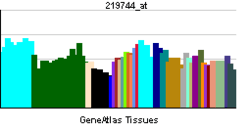Fructosamine-3-kinase
| FN3K | |||||||||||||||||
|---|---|---|---|---|---|---|---|---|---|---|---|---|---|---|---|---|---|
| Identifiers | |||||||||||||||||
| Aliases | FN3K | ||||||||||||||||
| External IDs | MGI: 1926834 HomoloGene: 23336 GeneCards: FN3K | ||||||||||||||||
| |||||||||||||||||
| RNA expression pattern | |||||||||||||||||
 | |||||||||||||||||
| More reference expression data | |||||||||||||||||
| Orthologs | |||||||||||||||||
| Species | Human | Mouse | |||||||||||||||
| Entrez | |||||||||||||||||
| Ensembl | |||||||||||||||||
| UniProt | |||||||||||||||||
| RefSeq (mRNA) | |||||||||||||||||
| RefSeq (protein) | |||||||||||||||||
| Location (UCSC) | Chr 17: 82.74 – 82.75 Mb | Chr 11: 121.43 – 121.45 Mb | |||||||||||||||
| PubMed search | [1] | [2] | |||||||||||||||
| Wikidata | |||||||||||||||||
| View/Edit Human | View/Edit Mouse |
Fructosamine-3-kinase is an enzyme that in humans is encoded by the FN3K gene.[3][4][5]
Function
FN3K catalyzes phosphorylation of fructosamines formed by glycation, the nonenzymatic reaction of glucose with primary amines followed by Amadori rearrangement. Phosphorylation of fructosamines may initiate metabolism of the modified amine and result in deglycation of glycated proteins.[5][6]
FN3K is responsible for the formation of fructose 3-phosphate (F3P), a compound identified in the lenses of diabetic rats. The spontaneous decomposition of F3P leads to the formation of 3-deoxyglucosone (3DG). 3DG contributes to diabetic complications. Treatment of normal and diabetic rats with an inhibitor of FN3K demonstrated a large reduction (~50%) in systemic 3DG in both groups. Removal of 3DG at its source by inhibition of FN3K is a viable option to treat diabetes related diseases since it would require a much smaller dose of drug.
References
- ↑ "Human PubMed Reference:".
- ↑ "Mouse PubMed Reference:".
- ↑ Szwergold BS, Howell S, Beisswenger PJ (Aug 2001). "Human fructosamine-3-kinase: purification, sequencing, substrate specificity, and evidence of activity in vivo". Diabetes. 50 (9): 2139–47. doi:10.2337/diabetes.50.9.2139. PMID 11522682.
- ↑ Delpierre G, Van Schaftingen E (Dec 2003). "Fructosamine 3-kinase, an enzyme involved in protein deglycation". Biochem Soc Trans. 31 (Pt 6): 1354–7. doi:10.1042/BST0311354. PMID 14641062.
- 1 2 "Entrez Gene: FN3K fructosamine 3 kinase".
- ↑ Delpierre G, Collard F, Fortpied J, Van Schaftingen E (August 2002). "Fructosamine 3-kinase is involved in an intracellular deglycation pathway in human erythrocytes". Biochem. J. 365 (Pt 3): 801–8. doi:10.1042/BJ20020325. PMC 1222720
 . PMID 11975663.
. PMID 11975663.
Further reading
- Delpierre G, Rider MH, Collard F, et al. (2000). "Identification, cloning, and heterologous expression of a mammalian fructosamine-3-kinase.". Diabetes. 49 (10): 1627–34. doi:10.2337/diabetes.49.10.1627. PMID 11016445.
- Strausberg RL, Feingold EA, Grouse LH, et al. (2003). "Generation and initial analysis of more than 15,000 full-length human and mouse cDNA sequences.". Proc. Natl. Acad. Sci. U.S.A. 99 (26): 16899–903. doi:10.1073/pnas.242603899. PMC 139241
 . PMID 12477932.
. PMID 12477932. - Ota T, Suzuki Y, Nishikawa T, et al. (2004). "Complete sequencing and characterization of 21,243 full-length human cDNAs.". Nat. Genet. 36 (1): 40–5. doi:10.1038/ng1285. PMID 14702039.
- Delpierrre G, Vertommen D, Communi D, et al. (2004). "Identification of fructosamine residues deglycated by fructosamine-3-kinase in human hemoglobin.". J. Biol. Chem. 279 (26): 27613–20. doi:10.1074/jbc.M402091200. PMID 15102834.
- Delplanque J, Delpierre G, Opperdoes FR, Van Schaftingen E (2004). "Tissue distribution and evolution of fructosamine 3-kinase and fructosamine 3-kinase-related protein.". J. Biol. Chem. 279 (45): 46606–13. doi:10.1074/jbc.M407678200. PMID 15331600.
- Conner JR, Beisswenger PJ, Szwergold BS (2004). "The expression of the genes for fructosamine-3-kinase and fructosamine-3-kinase-related protein appears to be constitutive and unaffected by environmental signals.". Biochem. Biophys. Res. Commun. 323 (3): 932–6. doi:10.1016/j.bbrc.2004.08.181. PMID 15381090.
- Gerhard DS, Wagner L, Feingold EA, et al. (2004). "The status, quality, and expansion of the NIH full-length cDNA project: the Mammalian Gene Collection (MGC).". Genome Res. 14 (10B): 2121–7. doi:10.1101/gr.2596504. PMC 528928
 . PMID 15489334.
. PMID 15489334. - Conner JR, Beisswenger PJ, Szwergold BS (2005). "Some clues as to the regulation, expression, function, and distribution of fructosamine-3-kinase and fructosamine-3-kinase-related protein.". Ann. N. Y. Acad. Sci. 1043: 824–36. doi:10.1196/annals.1333.095. PMID 16037310.
- Delpierre G, Veiga-da-Cunha M, Vertommen D, et al. (2006). "Variability in erythrocyte fructosamine 3-kinase activity in humans correlates with polymorphisms in the FN3K gene and impacts on haemoglobin glycation at specific sites.". Diabetes Metab. 32 (1): 31–9. doi:10.1016/S1262-3636(07)70244-6. PMID 16523184.
- Szwergold BS (2007). "Fructosamine-6-phosphates are deglycated by phosphorylation to fructosamine-3,6-bisphosphates catalyzed by fructosamine-3-kinase (FN3K) and/or fructosamine-3-kinase-related-protein (FN3KRP).". Med. Hypotheses. 68 (1): 37–45. doi:10.1016/j.mehy.2006.06.030. PMID 16920277.